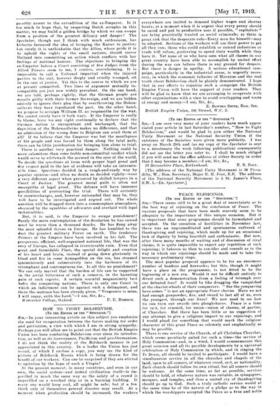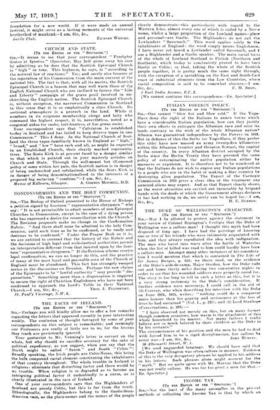PEACE REJOICINGS.
[To THE EDITOR OF THE SPECT/TOR-'1 Sun,—There seems still to be a great deal of uncertainty as to the best way of rejoicing on the conclusion of Peace. The various proposals that have been made scarcely seem to be adequate to the importance of this unique occasion. But it is tmportant that some programme should be formulated and accepted. On the cessation of hostilities in November last, there was an unpremeditated and spontaneous outbreak of thanksgiving and rejoicing, which made up for an occasional lack of dignity by being heartfelt and enthusiastic. But now, after these many months of waiting and of discussion of rival claims, it is quite impossible to expect any repetition of such rejoicing; it behoves us then to consider and consult as to the way in which our rejoicings ehould be made and to take the necessary preliminary steps.
The most popular proposal appears to be for an enormous number of bonfires and fireworks; but this, though it might have a place on the programme, is not fitted to be the beginning of a new era. Would it not be difficult entirely to divest such a demonstration from a feeling of triumph over our defeated foes? It would be like dragging the vanquished at the chariot-wheels of their conquerors. " See the conquering hero comes " is not an appropriate Peace chorus. Have we not had enough gunpowder, fire, and sword to last all of us, even the youngest, through our lives? We now need to see how we can turn our swords into ploughshares. Peace is a time for rest, for concord, for unions—union of classes, of .Parties, of Churches. But there has been little or no suggestion of any attempt to give a religious import to our rejoicings, and I would plead for something that would mark the religious character of this great Peace as solemnly and emphatically as may be possible.
There is one service of the Church, of all Christian Churches, which seems peculiarly suited for such a time—the service of Holy Communion—and, in a word, I would commemorate this great occasion and all its possible developments by a universal celebration of Holy Communion in which, and in singing the Te Deana, all should be invited to participate. I would have a simultaneous service in all the churches and chapels of thus land, Open to all corners, of whatever creed, sect, or nationality. EacKelturch should follow its own ritual, but all corners should be welcome. At the same time, as far as possible, services should be held, of whatever nature was suitable, in synagogues, mosques, and temples, and thus a united cry of thanksgiving should go up to God. Such a truly catholic service would at the same time be of Ilse nature of a pledge as to the stay in which the worshippers accepted the Peace as a true and noble
foundation for a new world. If it were made an annual festival. it might serve as a lasting memento of the universal brotherbod of mankind.—I am, Sir, Stc.,



































 Previous page
Previous page